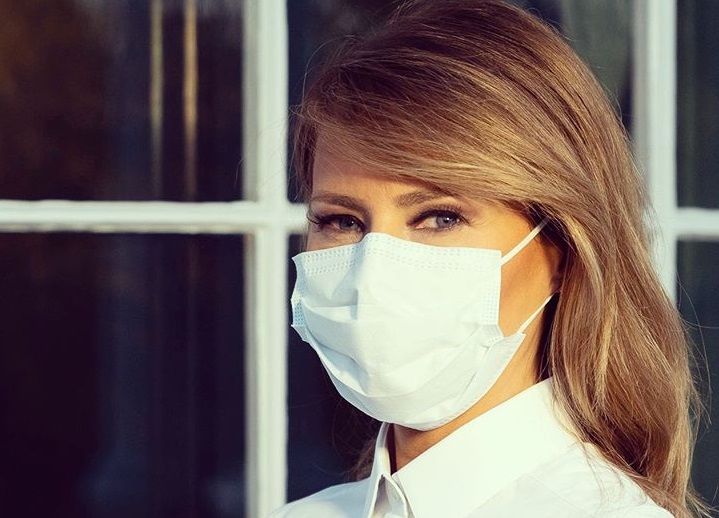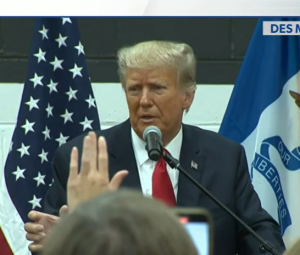In contrast to the enthusiasm evident four years ago in Melania Trump’s homeland Slovenia as she ascended to the status of US First Lady, now even her hometown has cooled on the country’s most famous daughter.
In 2016 Slovenia’s media followed the US presidential campaign with bated breath, but now the coronavirus pandemic is dominating headlines and crowding out coverage of whether Melania will stay in the White House alongside her husband President Donald Trump after Tuesday’s US election.
Most Slovenian media have portrayed Trump’s bid for re-election as an uphill struggle and many speak of disappointment at the low-key role Melania has played.
A rare voice of enthusiasm for Trump has been centre-right Prime Minister Janez Jansa, who tweeted his support earlier this month — but even he forgot to mention the family ties to Slovenia.
Jansa said Trump’s Democratic opponent Joe Biden “would be one of the weakest presidents in history,” adding: “a free world desperately needs STRONG US as never before. Go, win, Donald Trump!”
Jansa thus joined his political ally, nationalist Hungarian Prime Minister Viktor Orban, in openly backing Trump for a second term.
But unlike Jansa, many politicians in Slovenia have backed Biden or diplomatically avoided taking sides.
Even Srecko Ocvirk, mayor of Melania’s hometown Sevnica, can’t bring himself to utter an endorsement.
“As a Slovenian citizen I elect our country’s president, therefore I can’t comment on the US elections,” Ocvirk told AFP.
In a rare article dedicated to Melania Trump entitled “A woman that never looks back”, weekly newspaper Nedeljski Dnevnik noted that many Slovenians had high hopes four years ago for how Melania’s homeland might benefit from her newfound fame.
“In 2016 a variety of products with Melania’s image and name popped up as many wanted to cash in on her global fame in an innovative way,” the paper wrote in an editorial.
“Politicians and businessmen hoped it would strengthen ties with the White House… but all those hopes have been proved wrong,” the paper added.
The article noted that Melania rarely even mentioned Slovenia except when talking about her early life in an “un-free Communist state”.
Despite invitations being extended, the Slovenian media have not published a single interview or direct address by Melania to her compatriots.
Communication has largely been limited to a warning from Trump family lawyers addressed to entrepreneurs, deterring them from unauthorised use of Melania’s name and image.
Sevnica — a small town on the banks of the Sava river some 100 kilometres (60 miles) east of the capital Ljubljana — has at least seen some benefits from Melania’s status.
Thousands of tourists from the US and elsewhere have gone out of their way and braved the sometimes basic roads to reach the town, visit its 900-year-old castle and buy some of those Melania-themed products.
A local bakery says a “Melania cake” has become particularly popular and the local tourist office even offers a “First Lady” luxury package including high-end wine, salami, cookies and chocolates.
“Mrs Melania Trump has put Sevnica on the world map,” says Ocvirk.
“We’ve been given the opportunity to show a wider public the beauties of our region,” he said, adding that before the coronavirus stalled international travel, the number of tourists heading for Sevnica had increased up to 30% over the last four years.
But nowadays it’s the pandemic rather than the US elections which is uppermost in people’s minds here, with the town registering an above-average number of coronavirus infections.
The bar where the election results were followed through the night in November 2016 and celebrated by a small crowd of sympathisers and family friends is now closed due to Slovenia’s second-wave virus lockdown.
Close to the apartment building where Melania grew up, most mask-wearing residents were not keen to share their opinions on the US elections.
One local pensioner was surprised to be asked about the topic.
“I don’t think he (Trump) is going to win… he is a bad person,” said the pensioner, who did not wish to be named.
The only visible reference to Melania’s previous life in Sevnica is a life-size bronze statue erected by US conceptual artist Brad Downey that stands alone on a nearby field.
Since being unveiled last month, her face has been covered with a surgical mask.







